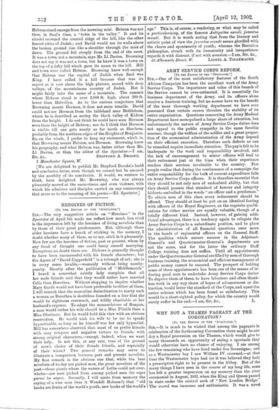ARMY SERVICE CORPS REFORM.
[To THE EDITOR OF THE "SPECTATOR."] SIR,—One of the most satisfactory features of the South African Campaign has been the excellent work of the Army Service Corps. The importance and value of this branch of the Service cannot be over-estimated. It is essentially the business department of the Army, and its officers alone receive a business training, but no sooner have we the benefit of the most thorough working department we have ever possessed than certain causes threaten the stability of its entire organisation. Questions concerning the Army Medical Department have monopolised a large share .of attention, but unfortunately the nature of Army Service Corps duties does not appeal to the public sympathy in the same forcible manner, though the welfare of the soldier and a great propor- tion of the economical administration of the Army depend on their efficient execution. Therefore such defects as can be remedied require immediate attention. The pay is felt to be inadequate to the work and responsibility involved, and the lack of encouragement to senior officers will lead to their retirement just at the time when their experience renders their services invaluable to the country. Few people realise that during the continuance of a campaign the entire responsibility for the bulk of current expenditure falls on Army Service Corps officers. It is therefore essential that they should be not only men of undoubted ability, but that they should possess that standard of honour and integrity hitherto embodied in the words " an officer and a gentleman." To obtain men of this class every inducement should be offered. They should at least be put on an identical footing with officers of the Royal Engineers, as the requisite qualifi- cations for either service are equally valuable, though of a totally different kind. Instead, however, of gaining addi- tional advantages, there is a tendency again to relegate the Army Service Corps to a subordinate position, and to place the administration of all financial questions once more in the hands of regimental officers on the General Staff. The qualities which ensure success in the Adjutant- General's and Quartermaster-General's departments are not the same, and for the latter the ordinary Staff College training does not suffice. Until all appointments under the Quartermaster-General are filled by men of thorough business training, the economical and efficient management of public money cannot be ensured. The prospect of holding some of these appointments has been one of the means of in- ducing good men to undertake Army Service Corps duties. To deprive them of these, to have laborious and often thank- less work in any way shorn of hopes of advancement or dis- tinction, would lower the standard of the Corps, and upset the entire scheme which has been found so satisfactory. This would be a short-sighted policy, for which the country would
surely suffer in the end.—I am, Sir, &c., L.










































 Previous page
Previous page